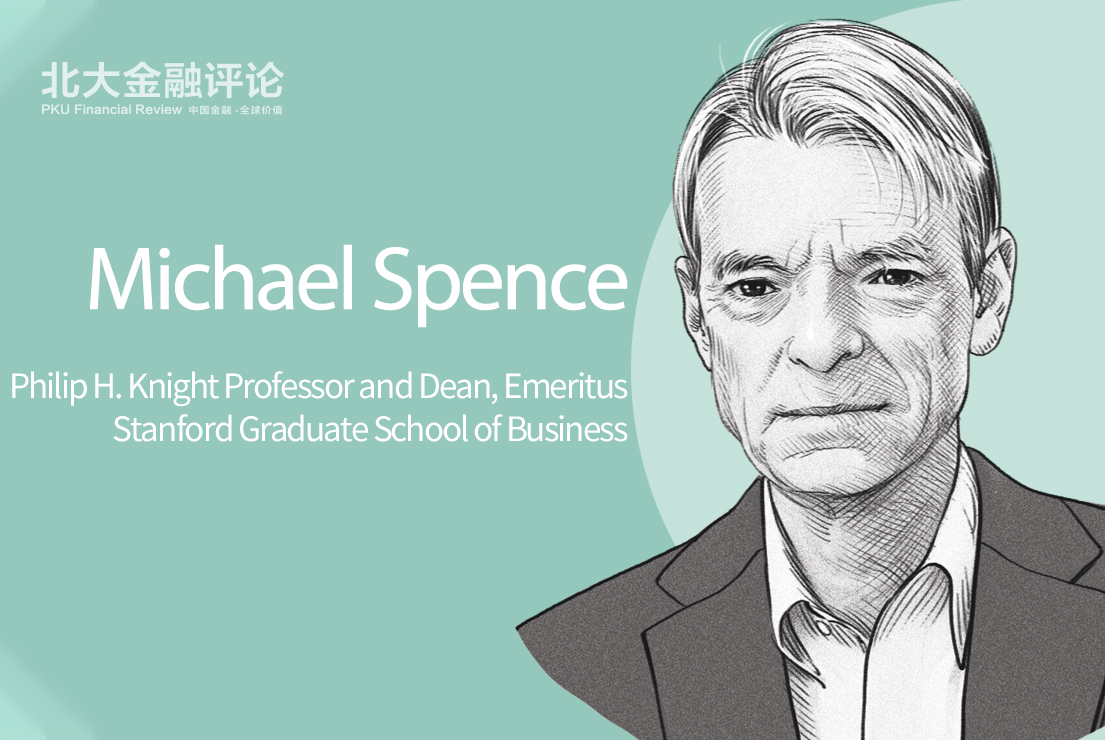Professor Michael Spence is the Philip H. Knight Professor and Dean, Emeritus at the Stanford Graduate School of Business, as well as a senior fellow at the Hoover Institution. In the interview with
PKU Financial Review, Professor Spence states that, a remaining challenge for the coming decades is to make sure that as the economies evolve structurally, driven by technology, changing patterns of economic interdependence, and more, that the resulting growth patterns are inclusive both domestically and internationally.
PKU Financial Review: Professor Michael Spence, to deal with the "Permacrisis", you argued for the necessity of adaptive growth models and a shift in macroeconomic management mindsets. Today, western countries are generally confronted with extremely high debt levels, severe global imbalances, and the dilemma of excessive financialization, seemingly unable to sustain future welfare accumulation. Based on your research, does this indicate that the inclusive welfare policies of the past have failed, and do we need new welfare policies as well?
Michael Spence: Your characterization of the situation in western economies is largely accurate. We do have rising debt levels. There are several new or increasingly impactful supply side constraints on growth including aging, declining productivity, and the need to invest in resilience via diversification. Shocks including the pandemic, wars, and climate events have also added to these headwinds and created an environment in which inflation, caused initially by demand exceeding supply, has returned after 30 decades. And this new environment requires new mindsets. Another way to say this is that a 3-4 decade period with powerful deflationary forces stemming from globalization and EME growth are no longer as powerful.
There is a reasonable chance that this pattern will change when the productivity potential of digital and especially AI kicks in probably near the end of this decade. In the meantime we are likely to have higher real interest rates, higher costs of capital, financial distress in some EME’s, and it will be a challenge (maybe even a struggle) to invest in the energy transition and climate change at sufficient levels ($4-6 trillion per year).
You are also correct that for the most part, the growth patterns of the past 3-4 decades have been characterized by rising income and wealth inequality, by degrees that vary by country. So the attempts to address this via redistribution and what is sometimes called pre-distribution have not been fully successfully. That said, it could have been worse without the programs that we have. So a remaining challenge for the coming decades is to make sure that as the economies evolve structurally, driven by technology, changing patterns of economic interdependence, and more, that the resulting growth patterns are inclusive both domestically and internationally. For the latter, we need a renewed and serious commitment to international cooperation.
PKU Financial Review: Thomas Piketty has pointed out three major ideological failures after World War II: the failure to develop theories on more equitable property rights, the failure to address the challenge of unequal education, and the failure to establish a new type of internationalism. In your opinion, in what forms are these three major issues most likely to be resolved in this century?
Michael Spence: I don’t disagree with Piketty in any fundamental way. But I do think the issues he mentioned are not entirely the result of ideological failures. I suspect he might agree. EME growth was a stunning achievement of the post war period. But that version of globalization did present distributional challenges that were not met successfully especially in developed economies. So let me address the three you mention.
Education is fixable with enough commitment and AI gives us powerful new tools to help get that done.
Establishing a new and pragmatic international order will depend on the willingness of the major economies, especially China and the USA, to work hard on it. It will not be the same as the earlier version. It will be more complicated, have more limitations related to national security and have much more infrastructure including regulation, related to data and data security. But it is not impossible to imagine progress on this front, especially in sustainability related issues where China has a clear leadership role.
Property rights and ownership of valuable assets is the third challenge. It is real. Most value creation now as opposed to 30 years ago as measured by equity valuations comes from intangible assets. The top 20 digital companies account for a third of the value of the S&P 500. That wealth is accumulating in the balance sheets of a relatively small group within the population. So yes. If this continues, then I believe we will need to find a way to assert some degree of public or collective ownership of this wealth creation. And it is not unreasonable. This wealth accumulation occurs in a system that requires investment including public sector investment, to sustain. Perhaps, one can argue, there should be a return on that investment that helps sustain future investment and provides resources to support services and income for the broader citizenry.
PKU Financial Review: We have also read the book "Medium and Long-term Development and Transformation of the Chinese Economy an International Perspective". What do you think China should do to address its growing inequality?
Michael Spence: China is now at the very upper end of the high middle income range and on a trajectory to be a high income country fairly soon. It is not therefore surprising that the growth patterns in China are starting to exhibit some of the distributional characteristics of western countries. But there are differences. China’s public sector assets are large because of dominant ownership of the SOE’s. Via this public ownership of assets, China may have more tools to address various dimensions of inclusiveness. In my view, with the goal of enhancing the inclusiveness of the growth, or common prosperity, probably the place to focus these resources would be on education at all levels, and on social security services including health and pensions. Of course, the investments in advancing the economy technologically are also important but less directly focused on inclusiveness.
PKU Financial Review: The world has entered the era of "Permacrisis". In your opinion, how can superpowers like China and the United States build consensus to achieve common prosperity?
Michael Spence: It seems to only practical way to do this is to accept the differences, focus on areas of common interest, areas that present systemic risks for the entire world, like climate, broader environmental challenges like water, biodiversity, cyber security. And then we need to maximize interactions at the level of individuals at all levels, and in all fields, sports, arts, science, education etc, to try to rebuild trust. It is really to only way that I know of to build trust.
















